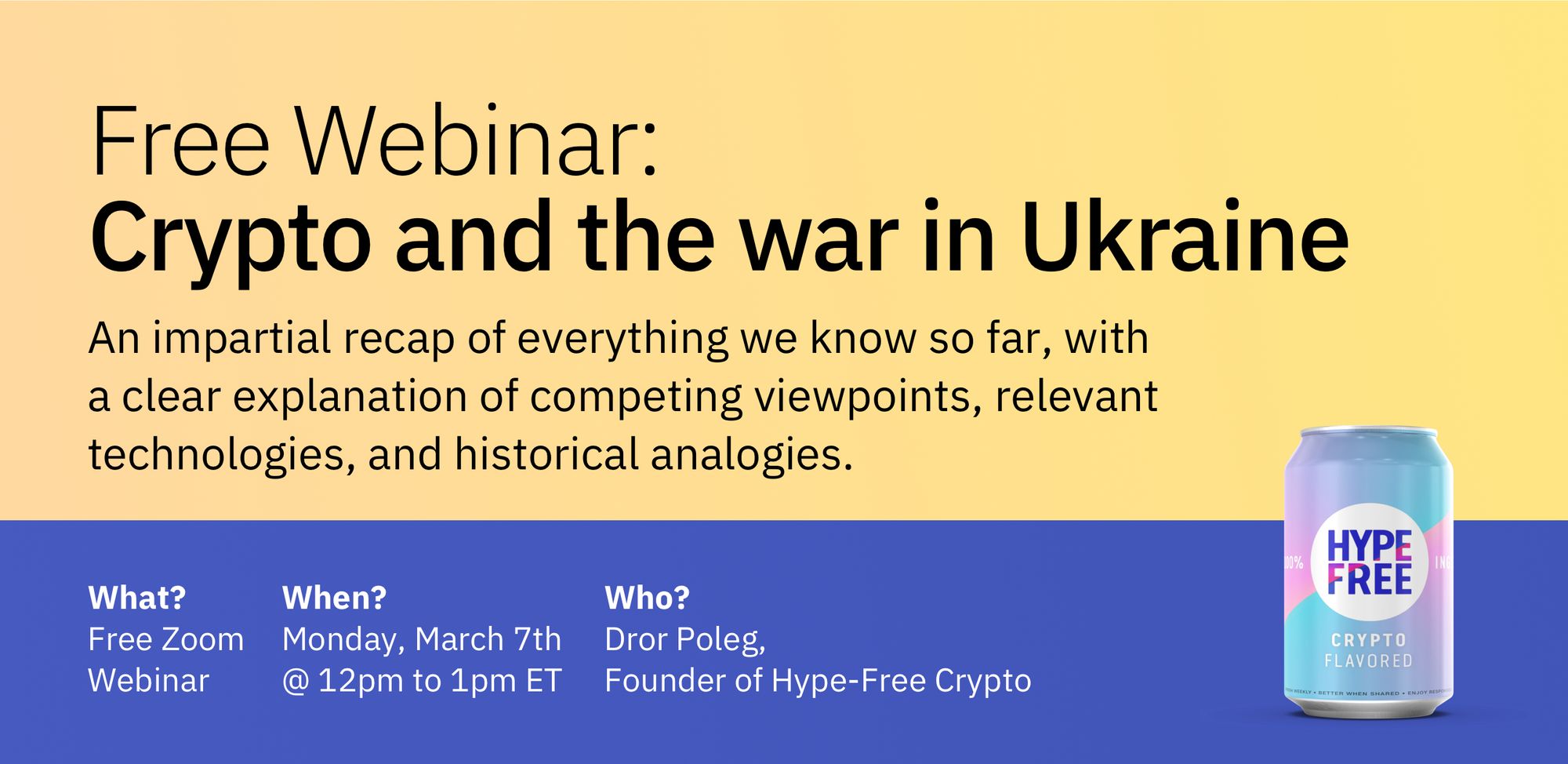Apeing into War
Crypto tokens don't just finance wars. They incentivize more people to join the fight.

🚀 Looking for a Corporate Crypto Course? Give your team a hands-on introduction to Blockchains, Decentralized Finance, and Web3 with our private corporate cohorts. Learn more here.
🧠 The 4th cohort of Hype-Free Crypto kicks off later this month. Join us for a hands-on introduction to the technologies and business models that will define the next decade.
🪖 On Monday, I am hosting a free webinar about Crypto & the War in Ukraine. We'll explore how cryptocurrencies are being used in the war, how recent sanctions will affect the evolution of crypto markets, and the main insights and dilemmas highlighted by this conflict.
Please register here for an impartial recap of everything we know so far, with a clear explanation of competing viewpoints, relevant technologies, and historical analogies.
🎧 Gil and I chatted with Eynat Guez, the CEO of Papaya Global, about the war's impact on global outsourcing and Israeli technology. In Hebrew, here.
Crypto tokens don't just finance wars. They incentivize more people to join the fight.
"Could you do this without crypto?" I asked my students back in December 2021. We were talking about ConstitutionDAO, an "organization" that raised $47 million from more than 18,000 people within a few days. The money was used to bid on a rare copy of the U.S. Constitution that was up for auction at Sotheby's.
Crowdfunding is not new. But ConstitutionDAO did not simply ask people for money. Instead, it promised each donor a set of $PEOPLE crypto tokens — tokens that would be created specifically for this project. If and when the group obtains the rare copy of the constitution, $PEOPLE token holders would be able to vote on where it would be displayed.
Ultimately, the group failed to win the auction, and it was time to return the $47 million to all the contributors. To get their money back, contributors had to claim the promised tokens and then convert them into another cryptocurrency or cash.
But as people started claiming their $PEOPLE tokens, the story took a surprising turn. As I wrote in In Praise of Ponzis:
The DAO fulfilled its purpose, albeit unsuccessfully, and it was time to return everyone's money and call it a day. Then something strange happened. The price of $PEOPLE tokens shot up dramatically. It was worth nearly 100 times more than what original contributors paid at its peak.
This means people were willing to pay a 10,000% premium in order to buy shares in a project that no longer has a purpose. And it wasn't just a handful of people — a whole liquid market emerged... nearly two weeks after the failed option, the daily trading volume in $PEOPLE tokens was over $70,000,000. Why would anyone pay to buy a token that no longer has a purpose?
There are many explanations why $PEOPLE still has a liquid market, but they all boil down to this: It's a good story. People love a good story. And people believe that the value of this story will only increase over time.
The crypto community sees the attempt to use a smart contract to buy a copy of the constitution as a historical event. The tokens are basically souvenirs, but they're also a bet on the growing significance of this event — a bet that the souvenirs will go up in value over time.
But it's not just a bet. It's also a marketing effort. By buying the tokens and ensuring there's a liquid market, investors help perpetuate and extend the story. This increases the likelihood that the tokens will indeed go up in value.
So, other people wanted to buy $PEOPLE tokens because they believed these tokens would go up in value thanks to their unique story, and thanks to the fact that once some people buy into a project, other people tend to pile on.
"This might seem silly or frivolous," I told my students. "But we can try to imagine how this mechanism can be used to fund other causes, to align the incentives of a large group of strangers towards another goal."
It didn't take too long for a more serious example to materialize.
On February 24, Patreon, a popular crowdfunding platform, suspended a campaign run by a Ukrainian NGO named Come Back Alive. The organization was collecting donations to finance and train military personnel. Patreon took down the campaign and refunded all the donations, stating "funding weapons or military activity" violates their user policies.
Two days later, the official Twitter account of the Ukrainian government tweeted a request for donations in cryptocurrency and included two Ethereum and Bitcoin addresses.
Unlike traditional crowdfunding platforms, crypto addresses do not require anyone's permission. Individuals can transfer money directly from their crypto "wallet" to the Ukrainian government. Within days, nearly $50 million were collected.
But money transfers are just the beginning. A few days into the campaign, the Ukrainian government tweeted that it is planning an "airdrop" — a cryptocurrency term that describes awarding tokens to people who contributed to a campaign. Airdrops are often used by cryptocurrency projects to reward their early customers and most active contributors. The tokens users receive can be converted to cash or kept as souvenirs that can be sold one day.
You can think of "airdrops" as similar to bonus miles you receive from an airline or as stock options you receive from an employer to reward you for your loyalty. But unlike airline miles or common shares, tokens can be immediately sold on the internet. More importantly, tokens that verify your contribution to a famous military campaign have something that's worth much more than money: they have a story.
As a token holder, you are now part of the story. And it becomes your goal to ensure this story continues and attracts as many supporters as possible — in order to increase demand for your token and drive up their value and historical significance. This dynamic is now independent of the war itself and of its desired outcomes. In the same way, a stock market frenzy is independent of economic fundamentals or the goals of the companies these stocks represent.
In the crypto world, we use the term "apeing" or "aping" (acting like an ape) to describe people who buy a token without doing proper research, following other people who bought before them (like a herd of apes). The term inspired some of the most popular NFT projects, such as the Bored Ape Yacht Club and Degenerate Ape Academy. In such projects, early buyers spend a lot of time on social media to convince other people to "ape in" and buy more tokens of the same project in an effort to generate more excitement and drive the price up.
By raising money from strangers on the internet, Ukraine did not just get "funding"; it also got an army of international supporters that are incentivized to recruit others to the cause and ensure the war continues to be at the center of attention for a long time and becomes an important historical event. In the end, this might be terrible for Ukraine. But it'll be a good story, and some people might make a lot of money from it.
This does not mean that people should not support Ukraine or donate to it. It means that tokens create incentive structures that ultimately take on a life of their own. These incentive structures might encourage more people to become passionate about this war, push their own governments to intervene, and, perhaps, even push the Ukrainian government to do things against its best interests.
In The Sleepwalkers, Christopher Clark describes how the world slid into World War I without anyone ever planning to do so. A series of isolated alliances and concerns coalesced into a self-reinforcing dynamic that was ultimately unstoppable. I fear we might be witnessing something similar now. And tokens contribute a new and powerful mechanism to support such a dynamic.
A day after announcing the airdrop, Ukraine's Vice Prime Minister tweeted that the government decided to cancel it. Instead, it plans to "announce NFTs to support Ukrainian Armed Forces." It is unclear whether the NFTs will be sent only to people who contributed to the initial campaign and whether the incentives will align in the way I described above. But even if they don't — we already have a playbook that another government can try next time.
__
Thank you for reading. If you enjoyed this piece, please share it, subscribe to my newsletter, check out my course, and join the free webinar on Monday to dive into various aspects of crypto and the war in Ukraine.

Dror Poleg Newsletter
Join the newsletter to receive the latest updates in your inbox.

